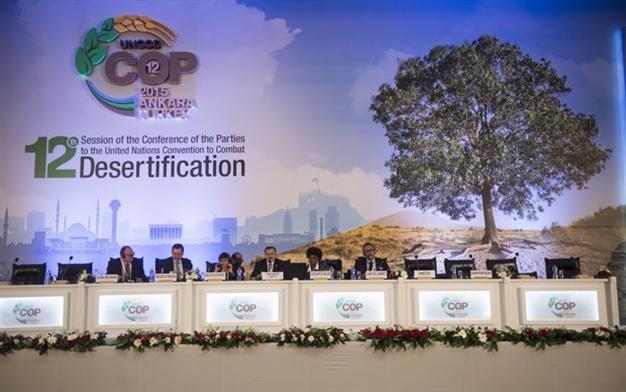Turkish capital hosts UN conference on combatting desertification
ANKARA

AA photo
The United Nations Convention to Combat Desertification (UNCCD) has opened its Twelfth Session of the Conference of the Parties (COP12) which will last until Oct. 23 in the Turkish capital city of Ankara.
About 100 minsters and heads of state and government are expected to attend the session over the next two weeks in Ankara. COP12 is the first major global meeting since world governments agreed on the Global Goals for Sustainable Development to guide international cooperation on social, economic and environmental action over the next 15 years.
At the opening session held on Oct. 12, the host country, Turkey, and several speakers delivered their statements. A moment of silence was observed for the families and all those who lost their lives in deadly bomb explosions that took place in the capital on Oct.10.
Namibian Environment and Tourism Minister Pohamba Shifeta, the outgoing COP11 president, opened the session and led the election of and then handed over the session to new COP12 President Veysel Eroğlu, Turkey’s Forestry and Water minister.
Eroğlu emphasized the importance of taking strong action against desertification, land degradation and drought, and spoke about Turkey’s dedication to the issue, highlighting its achievements in combating desertification through afforestation.
He presented Turkey’s plans to launch the Ankara Initiative, a multilateral platform for actions that specifically combat desertification, drought and land degradation. The platform is expected to be an important milestone in strongly combating desertification. Turkey has committed $5 million as well as capacity-building training to the initiative.
Monique Barbut, the UNCCD’s executive secretary, highlighted how desertification and land degradation amplify threats such as forced migration and conflict, and spoke about the Land Degradation Neutrality (LDN) project, a pilot exercise that has been run by the UNCCD with 16 country parties to test and refine the feasibility of LDN as a UNCCD target. She said the UNCCD has also contributed to the SDG monitoring framework by proposing a set of indicators for LDN, based on a sub-set of the progress indicators agreed to at COP11.
Barbut noted that if land degradation neutrality is adopted as a target by country parties, the UNCCD won’t need to change its strategy in 2018. The LDN Fund will support the achievement of land degradation neutrality, enabling repayments up to $2 billion towards large, sustainable land restoration projects. Land degradation neutrality also has implications for UNCCD operations. By measuring progress instead of process, the frequency of progress reports can be reduced to every four years. Land degradation neutrality will also streamline the way the convention meets and works.
Nicolas Hulot, the special adviser to the French president, meanwhile, said we are at a crucial stage for mankind, and progress is no longer a case of simply tweaking the status quo. He argued that we need to change paradigms. He highlighted that without soil, no future is possible. At COP12, parties effectively decide who will live and who will die.
